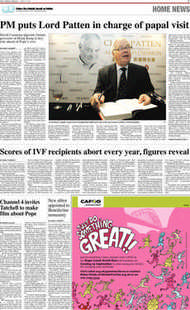Page 5, 11th June 2010
Page 5

Report an error
Noticed an error on this page?If you've noticed an error in this article please click here to report it.
Tags
Share
Related articles
Vatican Laments ‘useless Loss Of Life’ As 10 Die In Boat...
Pope Flies To Cyprus As Region Enters Crisis
Irish Cardinal Says Israel Should Lift Blockade Of Gaza
Benedict To Visit Cyprus Next June
Church Prays For End To Gaza Conflict
Pope appeals for peace during Cyprus visit
BY ED WEST
POPE BENEDICT XVI has called for calm in the Middle East following the Israeli storming of a flotilla of ships trying to break the blockade of Gaza.
Speaking during a trip to Cyprus last weekend, the Holy Father called for “concerted international effort” to ease tensions in the Middle East before more blood was spilled.
Tensions in the region rose ahead of the papal visit when Israeli commandos stormed a ship chartered by a Turkish Islamic charity which was trying to break Israel’s blockade of the Hamas-controlled enclave. IDF soldiers killed nine Turkish nationals, who had attacked the soldiers.
The deaths raised tensions between Israel and its longstanding Muslim ally, and led to anti-Israeli protests around the world. Tension was also raised after Iran, Israel’s number one security concern and a country reportedly close to building a nuclear weapon, offered to escort a humanitarian ship to Gaza. Last Saturday, while the Pope was on the eastern Mediterranean island, Israel’s navy boarded another ship carrying aid to Gaza without incident.
The Pope finished his threeday trip to the island, half of which is controlled by a Turkish state recognised only by Turkey, with a Mass for the tiny Catholic community in the overwhelmingly Orthodox south of the island.
About 10,000 people attended the Mass in stifling heat inside the city’s football stadium, including pilgrims from Syria, Jordan and Lebanon, who waved their national flags and those of the Vatican, and immigrants from India, Sri Lanka and the Philippines, who make up a large part of the Catholic faithful in mainly Orthodox Cyprus. They chanted “Viva o Papa” to the 83-year-old Pontiff.
He told those assembled: “On this grave matter, I reiterate my personal appeal for an urgent and concerted international effort to resolve the ongoing tensions in the Middle East, especially before such conflicts lead to greater bloodshed.” The Pontiff’s remarks reflected the theme of the working paper for October’s synod in Rome that he delivered to assembled bishops from the region after the service. As he presented the document, he expressed hope that Christians in the region might live in “peace and harmony with your Jewish and Muslim neighbours”.
A group of around 100 Orthodox Christian demonstrators staged a peaceful protest against Pope Benedict’s visit outside the Nicosia sports stadium, holding aloft banners calling the Pope “a heretic”.
Telemachos Telemachou told the Associated Press: “We don’t accept the Pope’s visit here. The Pope shouldn’t have come... We have nothing against Benedict as an individual, but with the heresy.” On the Saturday, the Pope had an unscheduled encounter with Sheikh Nazim, the 89year-old head of the Islamic Naqshbandi sect based in the Turkish-controlled north of Cyprus. The two men held a warm, brief conversation before exchanging gifts, and afterwards Nazim told reporters “may Allah grant him a good life here and hereafter”.
The Pope reflected on the tragedy of the divided island in a speech in Paphos in the west of the island, saying: “I have seen for myself something of the sad division of the island, as well as learning of the loss of a significant part of a cultural heritage which belongs to all humanity. I have also listened to Cypriots from the north who wish to return in peace to their homes and places of worship, and I have been deeply moved by their pleas.” The trip took place just days after the murder of a bishop in Turkey, but Benedict XVI accepted that the motive was personal and not religious, and police have arrested the bishop’s driver.
He paid tribute to Bishop Luigi Padovese, who was murdered last week by his driver in Iskenderun in Hatay province, saying he was a cleric who was committed to interreligious and cultural understanding. He said the death “surprised and shocked all of us”.
The Latin Patriarch of Jerusalem, whose diocese includes Cyprus as well as Jordan and the Holy Land, told Vatican Radio that Palestinian Christians were delighted by the visit.
Patriarch Fouad Twal said it was “one more sign of the solicitude and concern for this land, not forgetting the aspect of communion, of ecumenism, which he accomplishes with this gesture, whether with the Cypriot Orthodox and religious authorities or the civilian” authorities.
“We are very, very happy,” the patriarch said. “Cyprus has something in common with Jerusalem: the walls which are two steps away from here, which separate the country in two parts, north and south. We are used to these walls of shame that separate people, families, properties, parishes, priests and parishioners. It’s a tragedy that continues.” He said the flotilla incident “has done nothing other than aggravate the situation”.
“Good sense is totally lacking there,” the patriarch added. “If people see that politics is made up only of reactions of fear, we cannot do anything.
“Peace, trust and good will are lacking and perhaps it is up to us and to them, to the international community, to do something to create a mentality of peace, to change the way of thinking and not be afraid of peace.
“Up to now, some fear peace more than war,” said Patriarch Twal. “Yet peace is beautiful, we are in need of it and it is worth all our sacrifices.”
blog comments powered by Disqus





















